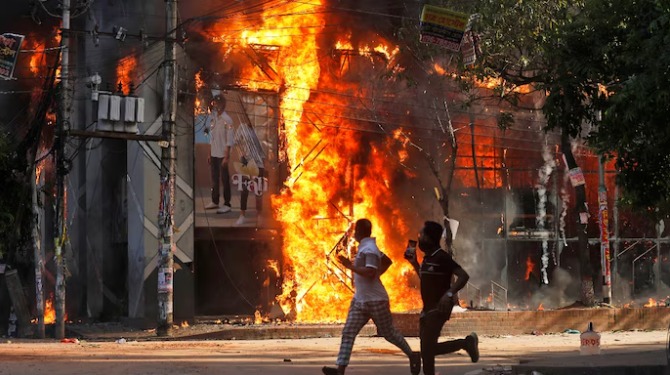5 August 2024: Bangladesh is in the throes of an unprecedented crisis, with the government of Prime Minister Sheikh Hasina teetering on the brink of collapse. As violence engulfs the nation, at least 93 people were killed on Sunday, including 13 police officers, amid widespread protests, as per a report by India Today. Offices of the ruling Awami League were set ablaze across multiple districts, and security forces have largely refrained from intervening against violent demonstrators.
The death toll has soared in clashes centered around the non-cooperation movement, with Dhaka-based Prothom Aalo reporting that police officers were beaten to death in Sirajganj. As the unrest intensifies, the Sheikh Hasina government has imposed an indefinite nationwide curfew starting at 6 pm on Sunday.
Experts predict that a transitional military government may take over if Hasina yields to the overwhelming demand for her resignation. The protests, which began as an anti-quota agitation on July 19, have since morphed into a broader call for political change, with six Awami League leaders reportedly beaten to death in Narsingdi city.
Mobile internet services have been partially shut down following directives to disable 4G services. The Bangabandhu Sheikh Mujib Medical University was set on fire, and the police and security forces have been notably absent from key conflict zones. Some former military officers have joined the student-led protests, with ex-Army Chief General Ikbal Karim Bhuiyan showing support.
The Bangladesh Army has stated that it stands by the people, with Army Chief Waker-uz-Zaman emphasizing the army’s role as a symbol of public trust. Despite this, Hasina has accused the protest leaders of being terrorists rather than students.
The government’s official toll for the unrest is around 250, but unofficial sources estimate it between 1,000 and 1,400. Factories in Dhaka, including garment, textile, and plastic units, have been set on fire amid the chaos.
The prolonged protests have roots in demands to abolish the quota system for government jobs, with the Supreme Court reducing the quota to 5 percent on July 21. However, the government’s alleged use of excessive force has fueled further unrest.




